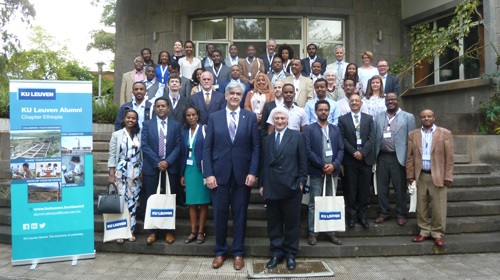
The largest university in Belgium, KU Leuven, has launched a new alumni chapter in Ethiopia. The university now boasts international chapters in eleven countries.
LEUVEN, Belgium (KU Leuven)–In 2013, KU Leuven established its first international alumni chapter in Shanghai, China. Today, the university has eleven international alumni chapters. Thailand and Ethiopia are the two most recent additions to the list: which were established in January and March 2018, respectively.
“These chapters are an important asset for KU Leuven,” says Vice Rector for International Policy Peter Lievens, who is also responsible for alumni policy. “Internationalization is very high on the KU Leuven agenda. Two key aspects of our current strategy are recruiting more students from abroad and promoting international mobility. And as more KU Leuven alumni go on to build international careers, we strengthen our global network.”
“This is where the international alumni chapters come in: they create opportunities for our alumni to connect with each other and constitute a direct link with the alma mater. We also call upon the chapters for cooperation, student recruitment, academic diplomacy, or to establish links with partner institutions and the local economy.”
“Our international alumni chapters are all about community-building,” says Martine Torfs from the Alumni Office at KU Leuven. “They are informal networks that help our alumni to (re)establish and maintain close ties with each other and with KU Leuven.”
“But we engage with our international alumni in other ways as well. We send newsletters, organize alumni trips or invite alumni to join us for education fairs in their country. We also reach out to honorary doctors and former visiting scholars because they are members of the KU Leuven community as well. They are ambassadors for our university.”
A firm foothold in Ethiopia
The new alumni chapter is the first on the African continent. Its launch marks the importance of Ethiopia for KU Leuven: the university has been cooperating with Ethiopian institutions since 1998.
KU Leuven has institutional partnerships with Mekelle University – its first partner in Ethiopia – and with Arba Minch University. The university is also involved in UGent-coordinated partnerships with Bahir Dar and Jimma universities. The cooperation efforts are typically multidisciplinary and focus on capacity building, institutional support, and mobility of staff and students. Belgian and Ethiopian researchers also collaborate on themes such as land degradation, ecology, sustainable livelihood and health. Projects with the universities of Addis Abeba and Ambo are ongoing as well.
“In the early days of our cooperation, most projects involved the KU Leuven Science, Engineering and Technology Group,” says Martine Dekoninck from the International Office at KU Leuven. “But today, KU Leuven also has social scientists working on gender and public administration in Ethiopia or biomedical scientists supervising Ethiopian PhD students, for instance.”
The cooperation between KU Leuven and Ethiopian universities creates unique opportunities for student mobility as well.
More than 320 Ethiopian students have already graduated from KU Leuven. Particularly popular among these students are the Faculties of Science, Engineering Science, and Bioscience Engineering. Many Ethiopian alumni received funding from the Flemish Interuniversity Council VLIR-UOS or the Interfaculty Council for Development Cooperation (IRO). One of them is Dr Getu Weldu, a former IRO scholar who is now the first chair of the alumni chapter in Ethiopia.
“Numerous KU Leuven students have already traveled to Ethiopia as well,” Martine Dekoninck continues. “They go there as part of their training or to do field work for their thesis. Some KU Leuven programs also take their master’s students to Ethiopia for field courses. And the new alumni chapter creates many more exciting opportunities for the future.”
Source: KU Leuven
